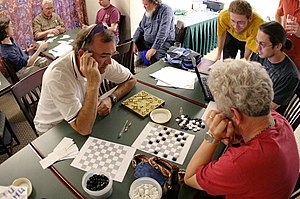What does combinatorial game theory mean?
Definitions for combinatorial game theory
com·bi·na·to·ri·al game the·o·ry
This dictionary definitions page includes all the possible meanings, example usage and translations of the word combinatorial game theory.
Wikipedia
Combinatorial game theory
Combinatorial game theory (CGT) is a branch of mathematics and theoretical computer science that typically studies sequential games with perfect information. Study has been largely confined to two-player games that have a position in which the players take turns changing in defined ways or moves to achieve a defined winning condition. CGT has not traditionally studied games of chance or those that use imperfect or incomplete information, favoring games that offer perfect information in which the state of the game and the set of available moves is always known by both players. However, as mathematical techniques advance, the types of game that can be mathematically analyzed expands, thus the boundaries of the field are ever changing. Scholars will generally define what they mean by a "game" at the beginning of a paper, and these definitions often vary as they are specific to the game being analyzed and are not meant to represent the entire scope of the field. Combinatorial games include well-known games such as chess, checkers, and Go, which are regarded as non-trivial, and tic-tac-toe, which is considered as trivial in the sense of being "easy to solve". Some combinatorial games may also have an unbounded playing area, such as infinite chess. In CGT, the moves in these and other games are represented as a game tree. Combinatorial games also include one-player combinatorial puzzles such as Sudoku, and no-player automata, such as Conway's Game of Life, (although in the strictest definition, "games" can be said to require more than one participant, thus the designations of "puzzle" and "automata".) Game theory in general includes games of chance, games of imperfect knowledge, and games in which players can move simultaneously, and they tend to represent real-life decision making situations. CGT has a different emphasis than "traditional" or "economic" game theory, which was initially developed to study games with simple combinatorial structure, but with elements of chance (although it also considers sequential moves, see extensive-form game). Essentially, CGT has contributed new methods for analyzing game trees, for example using surreal numbers, which are a subclass of all two-player perfect-information games. The type of games studied by CGT is also of interest in artificial intelligence, particularly for automated planning and scheduling. In CGT there has been less emphasis on refining practical search algorithms (such as the alpha–beta pruning heuristic included in most artificial intelligence textbooks), but more emphasis on descriptive theoretical results (such as measures of game complexity or proofs of optimal solution existence without necessarily specifying an algorithm, such as the strategy-stealing argument). An important notion in CGT is that of the solved game. For example, tic-tac-toe is considered a solved game, as it can be proven that any game will result in a draw if both players play optimally. Deriving similar results for games with rich combinatorial structures is difficult. For instance, in 2007 it was announced that checkers has been weakly solved—optimal play by both sides also leads to a draw—but this result was a computer-assisted proof. Other real world games are mostly too complicated to allow complete analysis today, although the theory has had some recent successes in analyzing Go endgames. Applying CGT to a position attempts to determine the optimum sequence of moves for both players until the game ends, and by doing so discover the optimum move in any position. In practice, this process is torturously difficult unless the game is very simple. It can be helpful to distinguish between combinatorial "mathgames" of interest primarily to mathematicians and scientists to ponder and solve, and combinatorial "playgames" of interest to the general population as a form of entertainment and competition. However, a number of games fall into both categories. Nim, for instance, is a playgame instrumental in the foundation of CGT, and one of the first computerized games. Tic-tac-toe is still used to teach basic principles of game AI design to computer science students.
Numerology
Chaldean Numerology
The numerical value of combinatorial game theory in Chaldean Numerology is: 6
Pythagorean Numerology
The numerical value of combinatorial game theory in Pythagorean Numerology is: 6
Translation
Find a translation for the combinatorial game theory definition in other languages:
Select another language:
- - Select -
- 简体中文 (Chinese - Simplified)
- 繁體中文 (Chinese - Traditional)
- Español (Spanish)
- Esperanto (Esperanto)
- 日本語 (Japanese)
- Português (Portuguese)
- Deutsch (German)
- العربية (Arabic)
- Français (French)
- Русский (Russian)
- ಕನ್ನಡ (Kannada)
- 한국어 (Korean)
- עברית (Hebrew)
- Gaeilge (Irish)
- Українська (Ukrainian)
- اردو (Urdu)
- Magyar (Hungarian)
- मानक हिन्दी (Hindi)
- Indonesia (Indonesian)
- Italiano (Italian)
- தமிழ் (Tamil)
- Türkçe (Turkish)
- తెలుగు (Telugu)
- ภาษาไทย (Thai)
- Tiếng Việt (Vietnamese)
- Čeština (Czech)
- Polski (Polish)
- Bahasa Indonesia (Indonesian)
- Românește (Romanian)
- Nederlands (Dutch)
- Ελληνικά (Greek)
- Latinum (Latin)
- Svenska (Swedish)
- Dansk (Danish)
- Suomi (Finnish)
- فارسی (Persian)
- ייִדיש (Yiddish)
- հայերեն (Armenian)
- Norsk (Norwegian)
- English (English)
Word of the Day
Would you like us to send you a FREE new word definition delivered to your inbox daily?
Citation
Use the citation below to add this definition to your bibliography:
Style:MLAChicagoAPA
"combinatorial game theory." Definitions.net. STANDS4 LLC, 2024. Web. 2 May 2024. <https://www.definitions.net/definition/combinatorial+game+theory>.



Discuss these combinatorial game theory definitions with the community:
Report Comment
We're doing our best to make sure our content is useful, accurate and safe.
If by any chance you spot an inappropriate comment while navigating through our website please use this form to let us know, and we'll take care of it shortly.
Attachment
You need to be logged in to favorite.
Log In